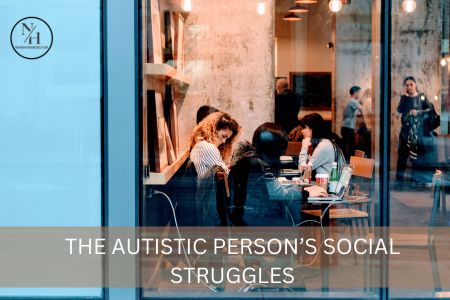One of the most common signs associated with autism is the lack of social skills. Most parents watch out for their babies’ or toddlers’ eye contact and ability to play with other children, and rightly so. These are indeed glaring signs of possible autism. However, these are not the only social difficulties that come with autism.
Our perception of autism can sometimes be limited to those who show these kinds of lack clearly and undoubtedly. But recent research shows that because autism occurs on a spectrum, it does not necessarily follow that everyone with autism will definitely show these signs.
However, social struggles in a person with autism are real. In this post, we want to share some examples of what makes social interactions difficult for autistic individuals. (Note that this post refers to autistic persons with language skills at par with their neurotypical peers.)
7 autistic traits that can cause social struggles
Here are some of the most common autistic traits that can make social interactions a struggle:
1. Sensory sensitivities
Most autistic individuals have a co-occurring diagnosis of sensory processing disorder. This means that they may be sensory-seeking or sensory-avoiding. For sensory-seeking individuals, this might mean a constant desire for movement, stimming, or sensory input like loud sounds and lights. For sensory-avoiding persons, this might mean a strong sensitivity to sensory input, like being annoyed by repeated sounds or noises that other people may not even notice.
For example, when someone has larger-than-usual response to sensory input, he may be more easily aggravated in places with lights and sound that do not affect the neurotypical individual. This means that it can be difficult for the neurotypical person to understand why his autistic friend or family member gets agitated, stressed, or even triggered into a sensory meltdown. When this happens constantly, it can cause the autistic person to feel ashamed of his struggles functioning in a world designed for neurotypicals.
2. A tendency to take things literally
Research shows that autistic individuals tend to take things literally. This means we may struggle to get jokes or social expressions.
For example, sometimes people can make comments like, “Let’s get together soon,” and the autistic person may take this as a literal invitation and not just politeness.
3. A common occurrence of rejection sensitivity
In Self-Care for Autistic People, Dr. Megan Neff describes rejection sensitivity as a common struggle among autistic individuals.
When an autistic individual grows up commonly misunderstood by friends and family, it can result in a greater tendency to be sensitive to rejection. This can happen both in real and perceived rejection, and can cause a lot of anxiety and overthinking, which also leads to more strained relationships.
4. A leaning towards black-and-white thinking
When an autistic person insists on following rules or calling out when someone seems to be diverting from rules, it can cause tension in relationships. This is especially true because the autistic person’s belief in voicing out when something is amiss can cause discomfort in the person that he or she is confronting.
5. A possibility to hyper-empathize
Another misconception of people with autism is that they don’t feel empathy. However, that is more of a hasty generalization; some autistic individuals may struggle with identifying feelings of empathy; others automatically sense and absorb the moods and feelings of people they encounter, which makes social gatherings so much heavier and harder to navigate.
6. A tendency to over-explain
Autistic individuals have the tendency to launch into over-explaining mode, especially when other people pose a question. This can either overwhelm other people or cause them to view the autistic individual as being defensive, which can strain relationships.
7. Masking (which may cause exhaustion)
Many autistic individuals resort to “masking” in order to appear more like the neurotypicals they interact with. This might involve forcing eye contact even when it’s uncomfortable, or adjusting the way they talk to appear less autistic.
While this is a survival skill to make things easier in social contexts, it can take a lot of energy and cause the autistic individual to feel exhausted. As a result, continued social interaction becomes even more difficult.
Dealing with the Autistic Person’s Social Struggles
If you are the family member or loved one of an autistic person, we hope this post helps you understand better why social interactions can be difficult. Knowing the behind-the-scenes of the emotional responses to social gatherings can help you be more proactive at providing accommodations.
If you are the autistic individual struggling with some of these things, we hope that understanding how these work can also help you find ways to cope better.


One response to “The Autistic Person’s Social Struggles ”
[…] Another common misconception is that autistic people are anti-social. The truth is, autistic individuals tend to have a lower social battery and need greater support for social interactions than neurotypicals. This is one of the reasons for the social struggles of autistic persons. […]